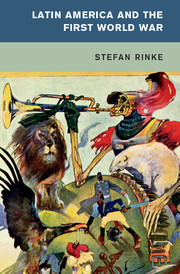Book contents
- Frontmatter
- Contents
- List of Figures
- Preface
- List of Abbreviations
- Introduction
- 1 The Global Context before 1914
- 2 Neutrality under Pressure, 1914-1917
- 3 In the Wake of War, 1917
- 4 Turbulent Paths into a “New Era,” 1918-1919
- 5 The Demise of a World
- 6 Nation and Trans-nation
- Epilogue: The Global Legacy of the World War
- Sources and Literature
- Chronology
- Index
Epilogue: The Global Legacy of the World War
Published online by Cambridge University Press: 09 March 2017
- Frontmatter
- Contents
- List of Figures
- Preface
- List of Abbreviations
- Introduction
- 1 The Global Context before 1914
- 2 Neutrality under Pressure, 1914-1917
- 3 In the Wake of War, 1917
- 4 Turbulent Paths into a “New Era,” 1918-1919
- 5 The Demise of a World
- 6 Nation and Trans-nation
- Epilogue: The Global Legacy of the World War
- Sources and Literature
- Chronology
- Index
Summary
Although the Treaties of Paris formally ended the war, peace remained hard to find on a global scale in 1919. The Latin American eyewitnesses who experienced the transition from a “hot” to a “cold” war watched the developments closely. For instance, Mariátegui remarked six years later in hindsight:
The world war not only shocked and transformed the West's economy and politics, but also its thinking and its spirit. The economic impact is not starker or easier to perceive than the spiritual and psychological consequences. Politicians and statesmen might discover a formula and method to deal with the former, but they will certainly not find a suitable theory or practice to surmount the latter.
In fact, the war propaganda transitioned into a postwar propaganda, especially in Latin America. The German side, above all, tried to refute the claim from the Treaty of Versailles that Germany alone was to blame for the war. The war remained part of the public consciousness to a certain extent because of the Cult of the Fallen, which foreign communities introduced to their countries of immigration shortly after the war. Memoirs, films, and novels, such as Erich Maria Remarque's All Quiet on the Western Front, ensured that the topic did not completely fade from memory. In addition, Latin American writers and artists were inspired by the tragedies of world war and created works of enduring value, such as Carlos Gardel with his tango classics “Silencio” or Heitor Villa-Lobos with his symphonies. By the same token, it is not possible to speak of a national culture of remembrance, even in countries like Argentina or Brazil. This is even more the case in other national contexts. Such a processing of the past remained too haphazard.
Nevertheless, the war undoubtedly meant a decisive turning point in the experience of Latin Americans of different nationalities, classes, generations, and genders. The outbreak of the world war initiated a crisis of dramatic proportion. The entire region could only look on helplessly, for the foundation of its economic development broke away along with the collapse of the liberal world economy. The export sector, which was critical to the lifeblood of all countries, went through a period of highly volatile shocks. These trends continued in many places long after the war. Not all countries, though, had the good fortune of being suppliers of war-essential raw materials.
- Type
- Chapter
- Information
- Latin America and the First World War , pp. 256 - 262Publisher: Cambridge University PressPrint publication year: 2017

